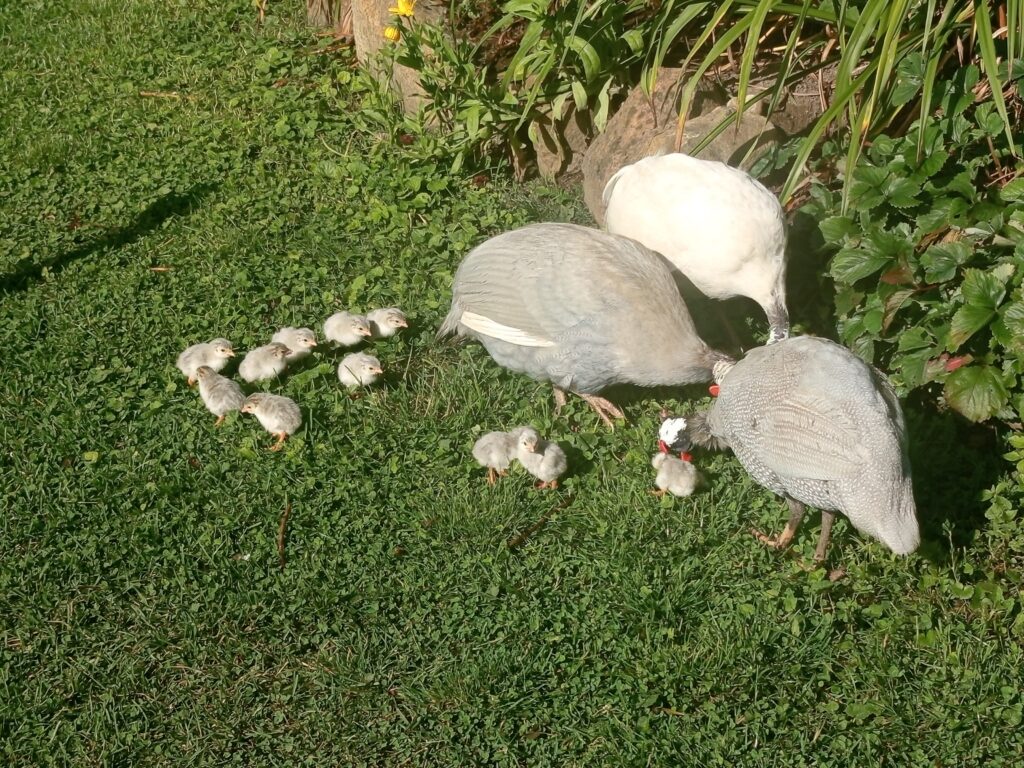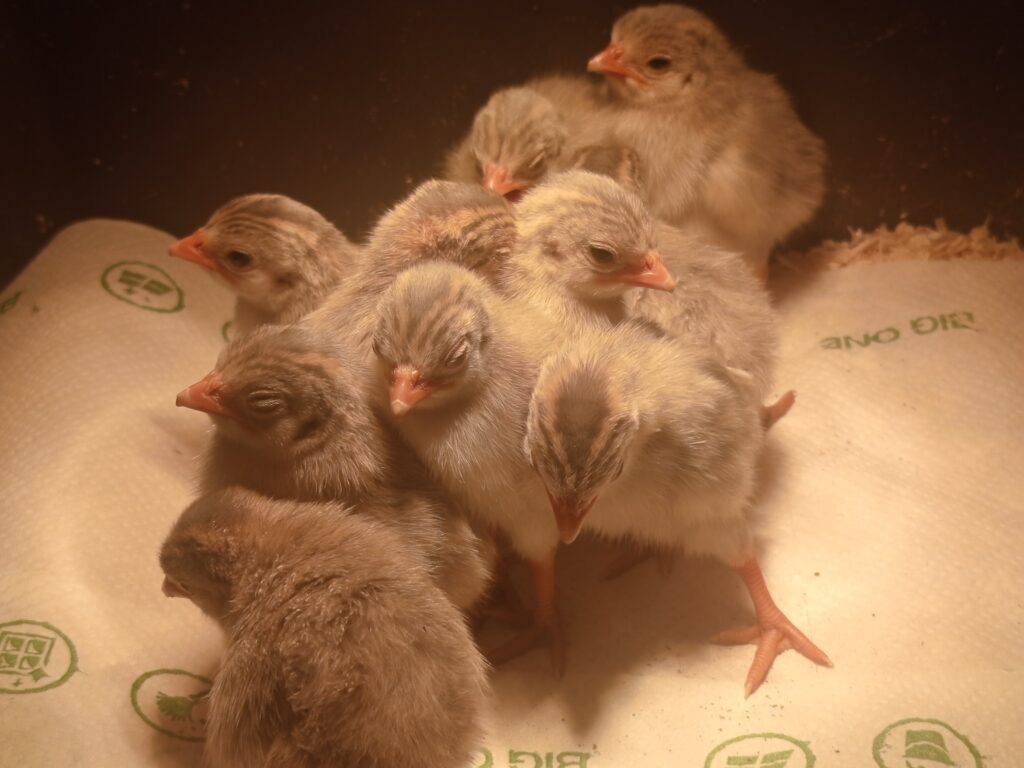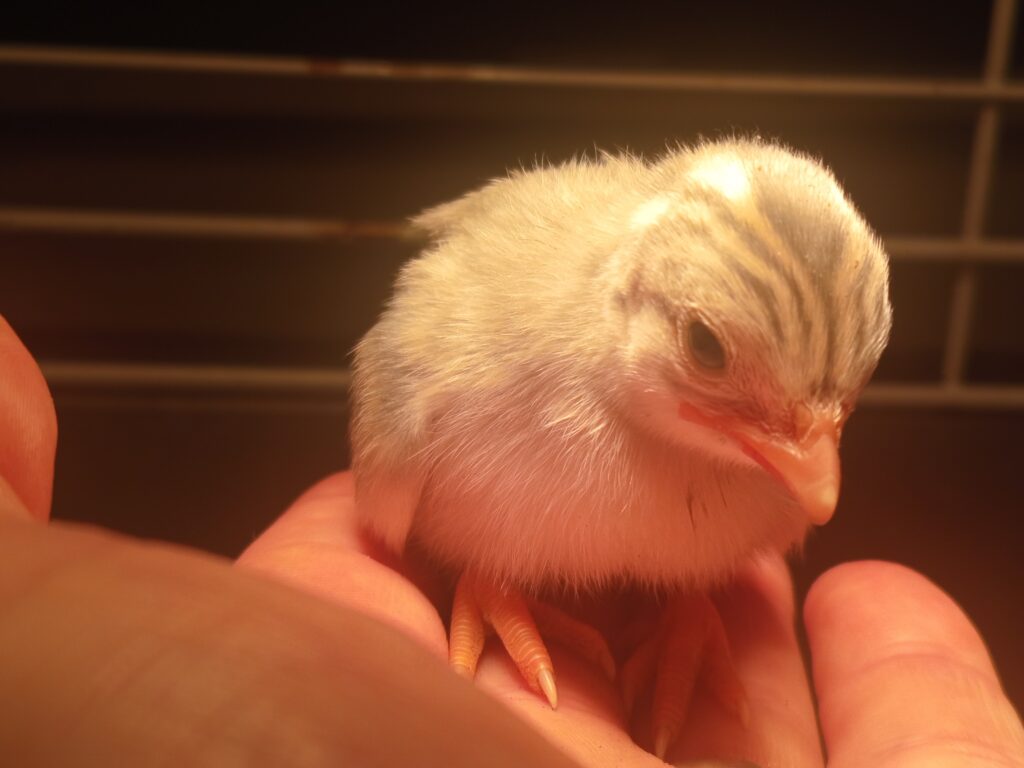Some mornings on the farm start with routine chores and predictable tasks. This morning started with one of the most delightful surprises we’ve ever experienced. A guinea fowl hen that we’d assumed was missing—possibly lost to predators or simply wandered off—emerged from the bushes with a parade of 11 tiny, fluffy baby chicks following behind her.
Nature had been conducting her own successful incubation program right under our noses.

The Mystery Solved
For weeks, we’d been wondering what happened to one of our guinea fowl. Guinea fowl aren’t exactly known for their predictable behavior, but this one had been absent long enough that we’d started to fear the worst. In rural Estonia, with foxes, martens, and other predators around, a missing bird often means a story with an unhappy ending.
We couldn’t have been more wrong.
Instead of becoming prey, she’d been methodically building a secret nest somewhere in the dense bushes surrounding our property, laying eggs, and then sitting on them with the patience and determination that only a broody bird possesses.
Nature’s Perfect Incubation
While we’ve been carefully monitoring temperature gauges, adjusting humidity levels, and tracking development in our artificial incubator, this guinea fowl hen accomplished the same thing with nothing but instinct, dedication, and perfect natural conditions.
The results speak for themselves: 11 healthy, active chicks that are already following their mother with the characteristic guinea fowl energy and alertness that makes them such effective pest controllers.

Guinea Fowl Nesting Behavior
This experience perfectly demonstrates why guinea fowl have such a reputation for being independent and secretive nesters. Unlike chickens, who often accept human-provided nesting boxes, guinea fowl frequently prefer to find their own secluded spots for raising families.
Their nesting strategy makes perfect sense from a survival perspective:
- Hidden locations reduce predator discovery
- Natural camouflage protects eggs and brooding mothers
- Remote nests keep human interference to a minimum
- Multiple escape routes are available if danger approaches
The downside, from a farmer’s perspective, is that you never know when or where they’ll decide to start a family, and you certainly can’t predict when they’ll emerge with results.
The Great Reveal
Seeing that guinea fowl mother emerge from the bushes with her parade of babies was like watching a magic trick. One moment, empty yard. The next moment, a complete guinea fowl family announcing their presence with the characteristic peeping and calling that makes these birds impossible to ignore.
The timing was perfect, too. The babies are clearly past the most vulnerable first few days of life, strong enough to follow their mother around, and alert enough to respond to her protective calls when anything seems amiss.

Natural vs. Artificial Success
This surprise puts our artificial incubation efforts in interesting perspective. While we’ve been working hard to achieve good hatch rates with careful temperature control and monitoring, nature managed a 100% success rate with this secret nest—assuming she started with 11 viable eggs.
There’s something both humbling and inspiring about that comparison. All our technology and careful monitoring produced good results, but this guinea fowl hen achieved perfect results using nothing but millions of years of evolutionary programming and maternal instinct.
Practical Decisions
As exciting as this surprise was, we had to make some quick decisions about the best way to ensure these babies thrive. We decided to move the chicks into our brooder setup rather than leave them to natural management.
While the mother had done an incredible job getting them this far, guinea fowl can be unpredictable, and we weren’t sure how a first-time mother would handle the ongoing care and protection of 11 active chicks. With predators in the area and changeable Estonian weather, the controlled environment of the brooder gives these babies the best chance for continued success.
It wasn’t an easy decision—there’s always something appealing about letting nature take its course completely. But responsible animal husbandry sometimes means stepping in to provide the security and consistency that gives young birds the highest survival rates.
Integration Challenges
Now comes the interesting part: integrating this surprise family into our established farm routine. Guinea fowl mothers are notoriously protective, and these babies are already imprinted on following their mother rather than accepting human management.
We’ll need to be strategic about:
- Providing appropriate food for rapidly growing guinea fowl chicks
- Ensuring they have safe spaces while respecting the mother’s protective instincts
- Monitoring their health and development without interfering with natural family dynamics
- Predator protection for a family group that may not accept confinement
The Bigger Picture
This surprise represents more than just additional guinea fowl for our property. It demonstrates the success of creating an environment where wildlife feels secure enough to reproduce naturally. When birds choose your property as safe enough for raising families, it’s a strong indicator of healthy habitat and minimal pressure from predators.
It’s also a reminder that sometimes the best farming results happen when you step back and let nature do what she does best. While artificial incubation gives us control and predictability, natural reproduction brings genetic diversity, behavioral authenticity, and the satisfaction of knowing your land supports complete life cycles.
Celebrating Natural Success
Eleven healthy guinea fowl chicks represent a perfect success story that we had no hand in creating but get to enjoy the benefits of. These birds will grow up to be our most effective tick and pest controllers, alarm system for the property, and a beautiful addition to our farm’s biodiversity.
Sometimes the best surprises are the ones that remind you that nature is perfectly capable of managing herself when given the right conditions and minimal interference.
Here’s to surprise hatches, secret nests, and the guinea fowl hen who proved that sometimes the best incubation happens when you’re not looking.
Have you ever experienced surprise broods or secret nests on your property? Share your stories of animals successfully raising families in unexpected places—we’d love to hear about nature’s surprises on other farms!
What’s been your most delightful farm surprise? Tell us about the unexpected moments that made all the work worthwhile!